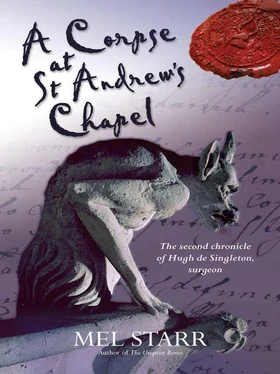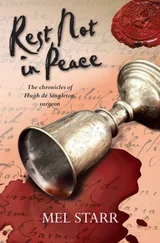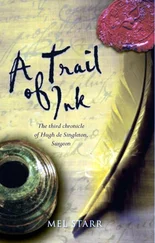Mel Starr - A Corpse at St Andrew's Chapel
Здесь есть возможность читать онлайн «Mel Starr - A Corpse at St Andrew's Chapel» весь текст электронной книги совершенно бесплатно (целиком полную версию без сокращений). В некоторых случаях можно слушать аудио, скачать через торрент в формате fb2 и присутствует краткое содержание. Год выпуска: 2010, Издательство: Kregel Publications, Жанр: Исторический детектив, на английском языке. Описание произведения, (предисловие) а так же отзывы посетителей доступны на портале библиотеки ЛибКат.
- Название:A Corpse at St Andrew's Chapel
- Автор:
- Издательство:Kregel Publications
- Жанр:
- Год:2010
- ISBN:нет данных
- Рейтинг книги:5 / 5. Голосов: 1
-
Избранное:Добавить в избранное
- Отзывы:
-
Ваша оценка:
- 100
- 1
- 2
- 3
- 4
- 5
A Corpse at St Andrew's Chapel: краткое содержание, описание и аннотация
Предлагаем к чтению аннотацию, описание, краткое содержание или предисловие (зависит от того, что написал сам автор книги «A Corpse at St Andrew's Chapel»). Если вы не нашли необходимую информацию о книге — напишите в комментариях, мы постараемся отыскать её.
A Corpse at St Andrew's Chapel — читать онлайн бесплатно полную книгу (весь текст) целиком
Ниже представлен текст книги, разбитый по страницам. Система сохранения места последней прочитанной страницы, позволяет с удобством читать онлайн бесплатно книгу «A Corpse at St Andrew's Chapel», без необходимости каждый раз заново искать на чём Вы остановились. Поставьте закладку, и сможете в любой момент перейти на страницу, на которой закончили чтение.
Интервал:
Закладка:
“Some other beast, then?” Shillside offered.
“What? A bear? Even in Scotland they are unknown. Wild dogs? What other ravages have been done? Hounds would take a sheep and leave the remains to mark their work, as would a wolf, I think. No such loss has been reported to me, or on the bishop’s lands either, or I should have heard of it.”
Another matter had troubled me. Alan’s feet were bare. “We found Alan’s staff, but where are his shoes? Would a man,” I asked my companions, “go out of a night to enforce curfew unshod?”
The reeve and coroner looked down to Alan’s feet. Shillside sucked on his lower lip, but neither man spoke. We all knew the answer to that question: not likely.
We bent again to the task of lifting Alan to Bruce’s broad back. The old horse shuffled when he realized what he was asked to bear. But the animal had borne Lord Gilbert in battle at Poitiers and had smelled blood and death. He did not flinch from his task. John took the halter and, at Bruce’s slow pace, our cortege moved to the town and Alan’s house on Catte Street.
The beadle’s home was like its neighbors. Built of timbers, wattle and daub, with a roof perhaps better thatched than most. A wisp of smoke drifted from the gable vent. We found Matilda planting onions in the toft behind the house. There is work which must be done even when a spouse has disappeared. No one had sought her out with the news that her husband was found. No one wanted to be the source of bad tidings or have the responsibility of comforting the disconsolate. So I did it. Hubert Shillside stood beside me as I spoke the words Matilda had feared for twenty-four hours. The knees of her surcoat were stained with earth, as were the hands which first dropped, then came up to cover the sobs which broke from a face new twisted in grief.
I saw a bench at the rear of the house and brought it to the woman. She sat, or rather, collapsed, gratefully upon it. Her sobs must have penetrated the house. Matilda had no sooner sat than an echoing wail arose from within. She had been trying to get work done before her son awoke.
The child’s cries brought Matilda’s to an end. She rose, brushed past me and the coroner, and ran to comfort her babe. She reappeared with the sobbing lad a moment later. The child blinked in the sunlight under sleep-tangled hair and peered suspiciously at me from the safety of his mother’s arms.
Matilda knew grief. She had renewed its acquaintance four months earlier, just before Christmas, when a newborn daughter died before ever seeing the light of day. The midwife, Katherine Pecham, was known by all to be competent. There was no fault in her work. Rare indeed the mother who sees all her children past the graveyard to maturity.
The woman stood in the doorway, then leaned heavily against the jamb. I felt compassion for her, but knew her sorrow would not endure long. There were in Bampton and the Weald five men under thirty-five or so years who were widowers or who had not yet taken a wife. One had lost a wife in childbirth. After a decent interval for her mourning, some would call. And as they cast jealous eyes on each other, the period allotted for Matilda’s mourning might become indecent. Well, she would have something to say about that.
Matilda was no more than twenty-five years old and prettier than most tenant’s wives who, by that age, are already worn with work and worry. And she would bring to a new marriage a half-yardland. She would be required to pay a heriot, and an entry fee for her son and heir when he was old enough to assume his father’s land. But these would not be burdensome. I knew this because, in the absence of Lord Gilbert and his steward, Geoffrey Thirwall, I would determine these fines.
“Where was he found?” Matilda asked.
The coroner told her, and explained that Alan’s death seemed likely caused by an attack of some wild beast, perhaps a wolf. Her eyes grew wide at this revelation.
I asked if she knew of any reason why her husband would leave the town on his rounds.
“Perhaps,” she whispered, “he saw the wolf and tried to drive it away.”
If indeed a wolf killed the man, that explanation was as good as any I and Hubert Shillside had contrived. I asked if I could see Alan’s shoes. Matilda was no fool.
“’E wore ’em, din’t he,” she retorted. “’E wan’t daft…t’go ’bout at night w’out shoes. ’Oo knows what a man might step on in the dark?”
I was properly silenced. But that was the answer I sought and expected. I traded a glance with the coroner. We exchanged raised eyebrows. At such moments I often try to raise but one eyebrow, as does Lord Gilbert Talbot. But I have been unable to master the pose. I am convinced it is an ability to which only the gentry are born.
“What ’appened to ’im?” she asked.
There followed a pause as Shillside and I each waited for the other to speak. The coroner looked away, as if he found some unusual event down Catte Street which required his attention. So I told her.
“We have brought him to you,” I concluded. “He is at your door, in the street. John Holcutt waits there with him. You may make arrangements with Thomas de Bowlegh to bury him tomorrow.”
The next day was Good Friday, but it would never again be good for Matilda, wife of the beadle. Each year at the remembrance of our Lord’s death she would recall her own loss and the day would be doubly distressing. I recall my own loss each time I see a pear or smell cloves or eat a Christmas feast.
“I will see him,” she said with some firmness, and turned to walk from the rear to the front of her small house. ’Twas but a few paces. The coroner and I followed.
John Holcutt stiffened when he heard the front door squeal open on winter-rusted hinges and saw Matilda and the child approach. Matilda stopped, staring at the horse and its burden for long minutes. None dared break the silence. Passers-by averted their eyes, crossed themselves, and silenced their steps.
Matilda stepped softly to her husband, shifted the child to her hip, and reached out a hand to sweep unruly hair from Alan’s cold forehead. She caressed her senseless husband and bent to whisper in the unhearing ear. I made it my business not to listen.
The spring sun was now well up over Bampton’s rooftops, shedding bright golden light on the scene. In this brilliance, as she stroked her dark-haired husband, something caught Matilda’s eye. I thought at first she had discovered the dent at the back of Alan’s skull, but this was not so. She parted his locks and drew forth a blue thread.
“What’s this, then?” she asked, and held the object forth.
Alan wore nothing blue. His surcoat was brown, his cotehardie yellow and his chauces grey. And no doubt his kirtle was as white as Matilda could make it.
I took the thread from her. It was a faded blue length of coarse woolen yarn, about as long as a finger. Matilda had plucked it from her husband’s scalp near the place where his head was bruised.
“Have you a garment of this color?” I asked.
“Nay…though ’tis common enough.”
I turned to Hubert Shillside. “Did any of those who found Alan this morning wear blue? I think not, but ’twas not full light yet, and my mind was otherwise occupied.”
The coroner thought back on the discovery and pursed his lips in concentration. “The plowman who remained in the field with the oxen, did he not wear a blue cotehardie?”
“I paid him no attention,” I admitted. “If you saw this I will take your word for it.”
Matilda looked from me to the coroner during this conversation. She held the thread before us between two fingers. “I think, Master Hugh, that all is not as you wish,” she said quietly.
Shillside gave me a look that said, “Now see what you’ve done!” I could not help it. I am not as those who can dissemble easily and hide their thoughts from others.
Читать дальшеИнтервал:
Закладка:
Похожие книги на «A Corpse at St Andrew's Chapel»
Представляем Вашему вниманию похожие книги на «A Corpse at St Andrew's Chapel» списком для выбора. Мы отобрали схожую по названию и смыслу литературу в надежде предоставить читателям больше вариантов отыскать новые, интересные, ещё непрочитанные произведения.
Обсуждение, отзывы о книге «A Corpse at St Andrew's Chapel» и просто собственные мнения читателей. Оставьте ваши комментарии, напишите, что Вы думаете о произведении, его смысле или главных героях. Укажите что конкретно понравилось, а что нет, и почему Вы так считаете.












